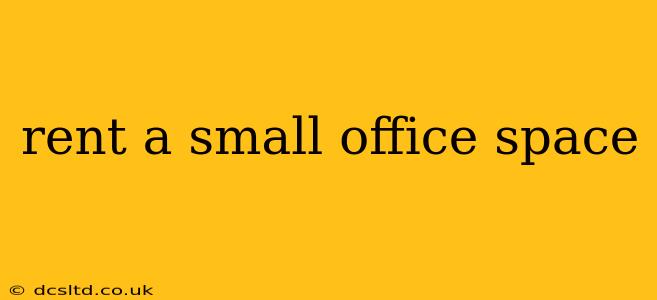Finding the perfect small office space can feel overwhelming. This comprehensive guide will walk you through the process, from understanding your needs to securing the ideal location for your business. We'll address common questions and concerns, helping you navigate this crucial step in your company's growth.
What are the different types of small office spaces available?
The market offers a variety of options for small businesses. You might consider:
- Traditional Office Suites: These are self-contained units within larger office buildings, offering privacy and a professional image. Amenities vary, but often include reception areas, shared restrooms, and potentially meeting rooms.
- Coworking Spaces: These shared workspaces provide a collaborative environment, often with amenities like high-speed internet, printers, and communal areas. They're a great option for startups or freelancers looking for flexibility and networking opportunities.
- Virtual Offices: This option provides a business address and potentially other services like mail handling and phone answering, without requiring a physical office space. Ideal for businesses with remote employees or those primarily operating online.
- Serviced Offices: Similar to traditional office suites, but often include additional services such as cleaning, IT support, and reception services, all rolled into one monthly fee. This can be a cost-effective solution for businesses that want to minimize administrative overhead.
- Shared Offices: This involves renting a portion of a larger office space, often with other businesses. This option provides a balance of privacy and cost-effectiveness.
How much does it cost to rent a small office space?
Rental costs vary significantly based on location, size, amenities, and lease terms. Prime locations in major cities will command higher rents than less central areas. The size of your space is another crucial factor, with costs generally increasing proportionally to square footage. Always factor in additional costs like utilities, insurance, and potential leasehold improvements. Researching average rental rates in your target area is crucial before beginning your search.
What factors should I consider when choosing a small office space?
Numerous factors play a vital role in your decision. Prioritize the following:
- Location: Consider proximity to clients, suppliers, transportation hubs, and your employees' homes. Access to amenities like restaurants and cafes can also boost employee morale.
- Size: Estimate your current and future space needs accurately. Allow for growth but avoid renting excessively large spaces to manage costs.
- Amenities: Essential amenities include reliable internet access, sufficient power outlets, adequate heating and cooling, and good security. Consider additional features like meeting rooms, kitchen facilities, and parking.
- Lease terms: Carefully review lease agreements, paying close attention to the length of the term, renewal options, and any clauses regarding rent increases.
- Budget: Determine a realistic budget before starting your search, considering all associated costs.
What are the typical lease terms for small office spaces?
Lease terms are usually one to five years, with longer terms sometimes offering lower monthly rates. Negotiating flexible terms, particularly for startups, is often possible. Read the fine print carefully to understand responsibilities for repairs, maintenance, and improvements.
What questions should I ask potential landlords?
Before committing, ask:
- What utilities are included in the rent?
- What are the security deposit requirements?
- What is the process for lease renewals?
- What are the rules regarding alterations or improvements?
- What are the parking options and associated costs?
- What security measures are in place?
- What are the building's accessibility features?
Finding the right small office space is a significant decision. By carefully considering your needs, conducting thorough research, and asking the right questions, you can find the perfect environment for your business to thrive. Remember to factor in long-term implications and choose a space that fosters productivity and reflects your brand image.
